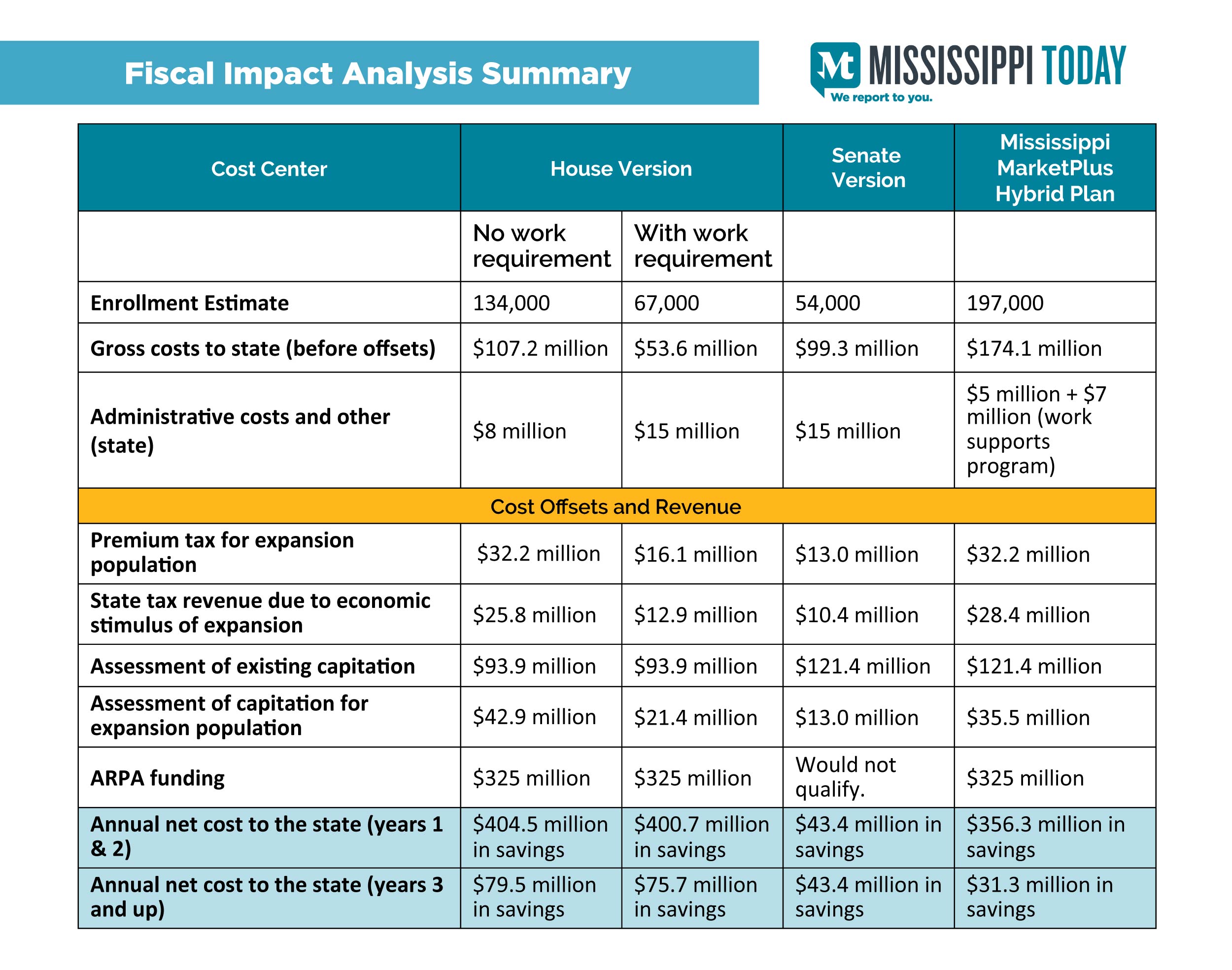Mississippi Today
Experts analyze House, Senate Medicaid expansion proposals, offer compromise plan

As Mississippi lawmakers look for compromise between widely differing House and Senate Mississippi Medicaid expansion plans, experts with a health research group have projected the costs, savings and efficacy of the plans and offered a third, potential compromise plan.
The analysis shows that under each plan, the state would see net annual savings – ranging from tens of millions to hundreds of millions of dollars – by expanding the state-federal Medicaid program to cover working, poor and uninsured Mississippians. The plans, the study says, also vary widely in how many Mississippians would be covered – from around 50,000 to nearly 200,000.
The study was commissioned by the Center for Mississippi Health Policy and conducted by the Hilltop Institute at the University of Maryland, Baltimore County. Hilltop has studied Medicaid expansion nationwide and recently testified before the Mississippi House Medicaid Committee.
“We wanted to get some updated numbers based on publicly available data,” said Morgan Henderson, director of analytics and research for Hilltop. “We really want to make sure folks having these discussions have data points they need.”
The study takes the House and Senate plans at face value, even though both contain elements not likely to be approved by the federal Centers for Medicare and Medicaid Services. The Senate plan, for instance, includes a stringent work requirement for coverage that, besides potentially costing millions in administrative fees, isn't likely to be approved by CMS.
Both the House and Senate plans contain another potential poison pill that could prevent expansion from being implemented. They have 12-month moratoriums on people who qualify for the expanded Medicaid coverage from dropping private coverage and applying for Medicaid. CMS is highly unlikely to approve this, and such moratoriums would probably not meet constitutional muster in a court.
The options
Mississippi Senate plan
One striking difference between the Senate plan and the House and compromise plans is the Senate one would turn down about $1 billion a year in federal money to cover more expansion costs. It also would forego nearly $700 million over the first two years in enhanced federal funding that some refer to as a “signing bonus” for states that fully expand Medicaid per the federal Affordable Care Act.
The Senate plan would provide coverage to people making up to 100% of the federal poverty level – about $15,000 a year for an individual. Hilltop estimates this plan would cover about 54,000 people, although Senate leaders said they estimate about 40,000 people would sign up.
The Senate plan would require participants to work 120 hours a month or be enrolled as a full-time student or in a workforce training program. It would exempt some from this requirement, including parents of children under 6, people mentally or physically unable to work or those who are caregivers to disabled family members.
Cost
The state's upfront cost of the Senate plan would be paid by a 3% tax on Medicaid managed care providers.
Hilltop estimates the Senate plan would cost the state a little over $114 million per year, including $15 million in administrative costs. But when these costs are offset by the tax on providers, the economic stimulus of expansion and other offsets or revenue, Hilltop estimates a net savings to the state of $43.4 million a year.
Mississippi House plan
The House plan would provide Medicaid coverage for people making up to 138% of federal poverty level, a little more than $20,00 a year for an individual. Hilltop estimates this would cover about 134,000 Mississippians (again, factoring in the “moratorium” on leaving private coverage).
The House plan calls for work requirements – 20 hours a week or enrollment as a student or in workforce development – but would still go into effect without the requirements if CMS fails to approve them.
Under this plan, Mississippi would draw down about $1 billion a year in increased federal Medicaid payments, and over the first two years, another nearly $700 million in enhanced federal payments.
Cost
The state share of upfront costs for the House plan would be covered by a 4% tax on Medicaid managed care providers.
Hilltop estimates the House plan, with no work requirement approved, would cost a little over $115 million, including $8 million in administrative costs. But when these are offset by the tax on providers, economic stimulus and other offsets or revenue, Hilltop estimates an annual savings for the state of more than $404 million a year for the first two years, then $79.5 million a year for the third year and beyond.
House Speaker Jason White and others have noted that the enhanced federal payments to the state totaling nearly $700 million over the first two years would cover all state costs for the first four years of the House expansion plan. White also noted that the House plan, even if a work requirement is not approved, would require the managed care organizations to track employment and other data from those covered.
Compromise ‘hybrid plan‘
Hilltop's “Mississippi MarketPlus Hybrid Plan” would offer expanded Medicaid coverage through the state's managed care program for those making under 100% of the federal poverty level. For those making 100% to 138% (up to $20,000 for an individual) of poverty level, the plan would use federal money to provide assistance for them to buy private insurance plans through Mississippi's marketplace exchange.
Hilltop estimates this plan would provide coverage for 197,000 Mississippians.
The plan would require managed care companies to provide employment support and require mandatory referral to workforce training. It would also require those covered to pay marketplace insurance co-pays, but would not include a work requirement or moratorium on people leaving private insurance.
Like the House plan, this plan is expected to qualify the state for enhanced federal Medicaid payments and the two-year “signing bonus” of nearly $700 million.
Cost
The plan, like the Senate's, includes a 3% tax on Medicaid managed care providers to help cover state costs.
Hilltop estimates the upfront cost to the state for this plan would be a little more than $186 million, including $12 million in administrative costs (including work support). But these would be offset by the tax on providers, economic stimulus from expansion and other offsets or revenue. Hilltop estimates a net savings to the state for this plan of more than $356 million a year for the first two years, then $31.3 million a year in savings for years three and up.
The Hilltop study also noted this plan would allow the state to receive a 90% federal match for services currently funded only with state dollars, including hospital services for incarcerated people and some behavioral health services.
Other findings
Hilltop's report says that Medicaid work requirements – when they were previously allowed by the feds – have not shown to increase workforce participation. It said, “Moreover, the Arkansas experience demonstrates that the administrative burden in reporting work status can lead to Medicaid coverage loss for the working poor – thus hurting the exact individuals designed to be covered under work requirements.”
A Georgia program similar to the Mississippi Senate's plan in several regards, has shown that stringent work requirements result in low enrollment and high administrative costs, the Hilltop study notes. As of recently, the Georgia program had enrolled only a few thousand people and over 90% of its costs to-date have been administrative costs and consulting fees. Georgia is still battling the federal government in court over its work requirements.
The Hilltop study found the Senate's plan “contains high budget risk” to the state. Since the plan eschews extra federal funding available for expansion, “if enrollment exceeds estimates, there would be proportionally greater budget overruns in the Senate version than the alternative plans.” It noted that to protect state coffers, language could be inserted to the House or hybrid plan that rescinds the expansion should the enhanced federal match drop.
This article first appeared on Mississippi Today and is republished here under a Creative Commons license.
Did you miss our previous article…
https://www.biloxinewsevents.com/?p=349711
Mississippi Today
Law enforcement officers’ oversight bill heads to governor’s desk
The Mississippi Senate passed legislation Monday to give the state's officer certification board the power to investigate law enforcement misconduct.
House Bill 691, the revised version of which passed the House Saturday, is now headed to the desk of Gov. Tate Reeves.
The bill comes in the wake of an investigation by the Mississippi Center for Investigative Reporting at Mississippi Today and The New York Times into sheriffs and deputies across the state over allegations of sexual abuse, torture and corruption. The reporting also revealed how a “Goon Squad” of officers operated for two decades in Rankin County.
Public Safety Commissioner Sean Tindell said if the governor signs the bill, he anticipates the Mississippi Board on Law Enforcement Officer Standards and Training would hire a few investigators to investigate matters and make recommendations.
The bill would enable the board to establish a hearing panel on any law enforcement officer “for whom the board believes there is a basis for reprimand, suspension, cancellation of, or recalling the certification of a law enforcement officer. The hearing panel shall provide its written findings and recommendations to the board.”
In addition, deputies, sheriffs and state law enforcement would join police officers in the requirement to have 20 hours of training each year. Those who fail to get such training could lose their certifications.
Other changes would take place as well. Each year, the licensing board would have to report on its activities to the Legislature and the governor.
The bill calls for a 13-member board with the governor having six appointments – two police chiefs, two sheriffs, a district attorney and the head of the law enforcement training academy.
Other members include the attorney general, the public safety commissioner, the head of the Highway Patrol, and the presidents of the police chiefs association, the constable association, the Mississippi Campus Law Enforcement Association and the sheriff's association (or designee).
This article first appeared on Mississippi Today and is republished here under a Creative Commons license.
Mississippi Today
Legislators extend 2024 session after missing budget deadline
Legislative leaders are optimistic that they will be able to start passing bills to fund the $7-billion budget to fund state services on Tuesday.
“We will be rolling Tuesday and the day after I suppose,” said Senate Appropriations Chair Briggs Hopson, R-Vicksburg.
Late Monday the House and Senate agreed on a resolution to extend the session. Appropriations and revenue (taxes and borrowing) bills died Saturday night when House and Senate leaders could not reach agreement on a key deadline. The resolution approved Monday was needed to revive the bills.
The final day of the session was scheduled for Sunday, May 5. Now it is scheduled for May 14, but House Speaker Jason White, R-West, predicted Monday that the Legislature will finish its work this week, though leaders did concede there were still some “minor” disagreements between the House and Senate.
Under the resolution, the legislators – even though their work would be completed this week — will return on May 14 unless White and Lt. Gov. Delbert Hosemann agree not to return.
Returning on May 14 would give the Legislature the opportunity address any possible vetoes by Gov. Tate Reeves. Lawmakers can override gubernatorial vetoes with a two-thirds vote of each chamber.
Asked Monday if an agreement had been reached on the revenue bills, Senate Finance Chairman Josh Harkins, R-Brandon, who handles those proposals, said, “Gosh, I hope so. If not I am going holler a Jerry Clower for them to shoot up amongst us,” Harkins said referencing a skit by the Mississippi comic.
It took a two-thirds vote of both chambers to pass the resolution to extend the session. It passed unanimously in the House, but six members of the 52-member Senate voted no. Without the resolution, it most likely would require a special session called by Gov. Tate Reeves to pass budget bills and revenue bills.
This article first appeared on Mississippi Today and is republished here under a Creative Commons license.
Mississippi Today
Lawsuit in death of man following Jackson police encounter may be headed to trial
The family of George Robinson plans to move forward with a wrongful death lawsuit against the city of Jackson and three former police officers after rejecting a nearly $18,000 settlement offer.
Attorney Dennis Sweet III made the intentions of Bettersten Wade, Robinson's sister, and Vernice Robinson, Robinson's mother, clear in a Thursday letter sent the day after the City Council approved a $17,786 payment to settle the family's 2019 lawsuit.
“This is more than anyone should have to endure. Much less have the City of Jackson tout the purported term of settlement as some sort of victory,” Sweet wrote in the letter. “Needless to say, no individual or party obtained a victory in this matter.”
The financial terms of the settlement and plaintiffs' identities were not supposed to be disclosed publicly and the council did not approve the settlement in executive session, Sweet said. According to Mississippi's open meeting law, any public body can enter executive session for a number of reasons, including for negotiations relating to litigation.
Sweet was not immediately available to comment Monday. Last week, he told WLBT he would take it to trial.
Council President Aaron Banks, who was also not immediately available for comment, said the settlement was freely negotiated among the parties and signed by Wade and Vernice Robinson, who had their attorneys with them, according to a Friday statement to the Clarion Ledger.
Banks disputed Sweet's claims that the city violated any terms of the settlement, such as a confidentiality agreement, saying the city didn't agree to one and that settlements are public records, according to the statement.
“The City intends to honor the agreement it reached and expects the Wade family to do so, also,” Banks said in the statement.
However, some city council members said after the meeting that they were not aware of a confidentiality agreement.
City Attorney Drew Martin declined to comment Monday.
All the parties met for mediation April 12. Sweet said that during the session, a representative from the city said it is in “financial straits and did not possess substantial funds in which to resolve Ms. Wade's claims against it.” The lawsuit complaint asked for a jury trial and damages to be determined by a jury.
Banks's statement did not address the attorney's claim about the city's finances.
Wade agreed during mediation to settle with ambulance provider American Medical Response and to allow the city to join that settlement and end litigation, according to Sweet's letter.
“Had AMR not agreed to a substantial settlement amount, Ms. Wade would not have settled with the City of Jackson,” he wrote in the letter.
The company settled for a different amount that was not disclosed, according to Sweet's letter.
As of Monday, electronic court filings for the lawsuit do not show that the judge has signed off on a settlement.
In January 2019, 62-year-old Robinson was pulled from a car and beaten by officers, leaving him with severe injuries. At the time, he was recovering from a stroke. Robinson died days later.
In 2022, former detective Anthony Fox was convicted culpable-negligence manslaughter for Robinson's death, while charges against officers Desmond Barney and Lincoln Lampley were dismissed a year earlier.
Fox was incarcerated until January when the Mississippi Supreme Court overturned his conviction and issued an acquittal, freeing him. Fox has returned to work for the Canton Police Department.
This isn't Wade's only loss and fraught experience with the city, Sweet said.
Last year, her son Dexter died after being hit by a car driven by an off-duty Jackson police officer. He was buried unidentified in the Hinds County pauper's field, despite having identification on him. His family did not know he was there until months later.
This article first appeared on Mississippi Today and is republished here under a Creative Commons license.
-
Local News4 days ago
Sister of Mississippi man who died after police pulled him from car rejects lawsuit settlement
-
Mississippi Today4 days ago
At Lake High School in Scott County, the Un-Team will never be forgotten
-
Mississippi Today2 days ago
On this day in 1951
-
Mississippi News3 days ago
One injured in Mississippi officer-involved shooting after chase
-
Mississippi News6 days ago
Viewers make allegations against Hatley teacher, school district releases statement – Home – WCBI TV
-
Mississippi News Video5 days ago
Vehicle struck and killed man lying in the road, Alcorn County sheriff says
-
Mississippi News4 days ago
Ridgeland man sentenced for molesting girl
-
Mississippi News5 days ago
Suspected Dollar General armed robber arrested in Pickens County


































